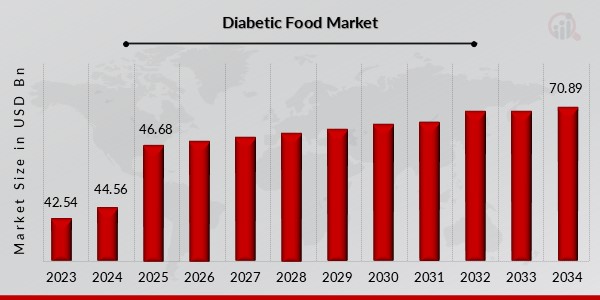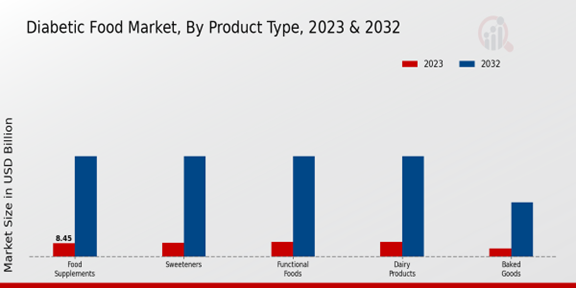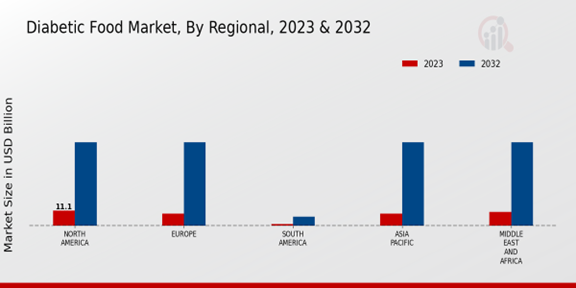Global Diabetic Food Market Overview
Diabetic Food Market Size was estimated at 44.56 (USD Billion) in 2024. The Diabetic Food Industry is expected to grow from 46.68(USD Billion) in 2025 to 70.89 (USD Billion) by 2034. The Diabetic Food Market CAGR (growth rate) is expected to be around 4.8% during the forecast period (2025-2034).

Source: Primary Research, Secondary Research, Market Research Future Database and Analyst Review
Key Diabetic Food Market Trends Highlighted
The diabetic food market is driven by the rising prevalence of diabetes and obesity worldwide, leading to a significant increase in the demand for diabetic-friendly products. The growing awareness of healthy eating habits and the need for customized diets for diabetic patient’s further fuel market growth.Key market drivers include the increasing adoption of low-carb and sugar-free diets, technological advancements in food processing and packaging, and the emergence of e-commerce platforms for health and wellness products. Opportunities lie in the development of innovative and functional diabetic foods, such as those with added fiber, probiotics, and other health-promoting ingredients.
Recent trends include the integration of artificial intelligence (AI) and machine learning (ML) in personalized diet planning for diabetics, as well as the rise of subscription-based services that deliver tailored diabetic meals to consumers. Additionally, the growing popularity of plant-based diets presents opportunities for the development of vegan and vegetarian-friendly diabetic food options.
Diabetic Food Market Drivers
Rising Prevalence of Diabetes
Diabetes is a chronic metabolic disorder characterized by increased blood sugar levels. The diabetes of the increasing prevalence all over the world is the major factor driving the growth of the diabetic food market. Currently, the International Diabetes Federation has reported that there are already more than 463 million diabetes patients, and the number will increase to around 700 million in 2045.
The increase in diabetes patients has created a demand for diabetic-friendly food that has low sugar, low carb, and high fiber characteristics.These products have benefits to help diabetics control their blood sugar levels to avoid complications such as heart disease, stroke, kidney failure, etc.
Growing Awareness of the Importance of Nutrition for Diabetes Management
The significance of nutrition for diabetes control is well-realized by both patient categories and healthcare providers. Diet is responsible for regulating blood sugar and averting aggravation, which is a critical concern. As time goes by, people prefer healthy and tasty meals that are good for their wellbeing. Ease of access to such meals is highly beneficial for diabetic people.
Government Initiatives to Promote Healthy Eating
With the change in consumer eating patterns due to busy lifestyles and demanding work life, fast food, and unhealthy eating have become a problem worldwide. Unhealthy eating often results in medical conditions, including obesity and diabetes. In a bid to promote healthy eating and reduce the risk of developing chronic diseases, the governments of many countries are implementing various initiatives, including public awareness programs, nutrition labeling regulations, and subsidies on healthy products.
Diabetic Food Market Segment Insights
Diabetic Food Market Product Type Insights
The Diabetic Food Market is divided by product type. Based on the product type, it is segmented into Food Supplements, Sweeteners, Functional Foods, Dairy Products, and Baked Goods. Among all these types, Food Supplements held the greatest market share in 2023, and it is expected to maintain its dominance. The growing consumption of this product type can be explained by the most significant prevalence of diabetes among the world’s population and the growing demand for easy and effective ways to control human blood sugar levels. Sweeteners are another important segment of the Diabetic Food Market.
They are popular among diabetic people as sugar-free sweeteners, as the number of people suffering from diabetes and blood pressure is always increasing. Functional Foods are also an important product type in the global market. Diabetic people have also started buying diabetic-friendly dairy products and baked goods. Although these two submarkets are not as large as the others, they are expected to continue growing because people consume diabetic products because they are convenient and the best foods to prevent diabetes.
To conclude, it must be said that the Diabetic Food Market will keep on growing in the future.It will most likely happen due to the increased awareness of the human diet on their blood sugar control. People will also consume more diabetic products because of the rising prevalence of diabetes in the world, the increasing population’s disposable income, and easy shipping and transportation of food.

Source: Primary Research, Secondary Research, Market Research Future Database and Analyst Review
Diabetic Food Market Distribution Channel Insights
The distribution channel segment in the Diabetic Food Market is important for market growth and consumer accessibility. Currently, supermarkets and hypermarkets have the largest share of the market, providing consumers with a wide range of diabetic food products. Convenience stores attract customers with minimal time for purchases and those who buy on impulse. Pharmacies use their leverage of health care support and better accessibility to provide the market with special diabetic food products.
Online sales benefit from a range of products and their subsequent delivery to the customer’s door, and they are increasingly popular among the younger modern population.Specialty diabetic food stores match products and services with specific dietary needs for diabetes and also benefit by providing personal care and making individual recommendations against their counterparts. Overall, as of 2023, the Diabetic Food Market revenue from online sales will reach $ 6.1 billion.
Diabetic Food Market Ingredient Insights
Stevia, xylitol, erythritol, aspartame, and maltitol are common sugar substitutes used in diabetic foods. Stevia, a natural sweetener derived from the stevia plant, is gaining popularity due to its zero-calorie content and potential health benefits. Xylitol, another natural sweetener, is commonly used in sugar-free chewing gums and candies and has been shown to have dental benefits. Erythritol, a sugar alcohol, is also calorie-free and has a mild cooling effect.
Aspartame, an artificial sweetener, is one of the most widely used sugar substitutes, but it has been controversial due to safety concerns.Maltitol, a sugar alcohol derived from starch, has a low glycemic index and is often used in sugar-free baked goods. The Diabetic Food Market revenue for the Ingredient segment is expected to grow significantly in the coming years, driven by rising demand for healthier food options and increasing prevalence of diabetes.
Diabetic Food Market Disease Insights
Disease Segment Insights and Overview The Diabetic Food Market is segmented by disease into Type 1 Diabetes, Type 2 Diabetes, Gestational Diabetes, and Prediabetes. Among these segments, Type 2 Diabetes holds the largest market share due to its high prevalence and increasing incidence rates. In 2023, the Type 2 Diabetes segment accounted for approximately 85% of the Diabetic Food Market revenue.
The Type 1 Diabetes segment is expected to grow at a steady pace, driven by the rising number of children and adolescents diagnosed with the condition.Gestational Diabetes and Prediabetes segments are also expected to witness significant growth in the coming years as awareness and screening programs increase.
Diabetic Food Market Regional Insights
The Diabetic Food Market is segmented into North America, Europe, APAC, South America, and MEA. North America held the largest market share in 2023 and is expected to maintain its dominance throughout the forecast period. The high prevalence of diabetes in the region, coupled with increasing awareness about the benefits of diabetic food, is driving the growth of the market in North America. Europe is the second-largest market for diabetic food and is expected to witness significant growth in the coming years.
The increasing geriatric population in the region, coupled with rising healthcare expenditure, is expected to drive the growth of the diabetic food market in Europe.APAC is the fastest-growing market for diabetic food and is expected to witness the highest CAGR during the forecast period. The increasing prevalence of diabetes in the region, coupled with rising disposable income and changing lifestyles, is expected to drive the growth of the diabetic food market in APAC. South America and MEA are expected to witness moderate growth in the diabetic food market during the forecast period.
The increasing prevalence of diabetes in these regions, coupled with rising healthcare expenditure, is expected to drive the growth of the diabetic food market.

Source: Primary Research, Secondary Research, Market Research Future Database and Analyst Review
Diabetic Food Market Key Players and Competitive Insights
Active participants in the Diabetic Food Market sector are investing their resources in research and development to offer innovative products that cater to the specific needs of diabetic people. In addition, key players in the industry depend on partnerships and acquisitions to enhance their product portfolio and expand their geographic presence. The demand for food is born from the increasing global population with diabetes that needs diets that are free from sugar and other components such as carbohydrates and calories.
In addition, industry players offer products with high content of fiber, vitamins, and minerals to ensure that diabetic people eat the necessary nutrients. There are many companies that offer food, and the competitive environment is composed of both established and emerging industry actors. The Diabetic Food Market is also characterized by the presence of highly stable established companies.Nestlé is one of the established companies that compete in the market.
The company offers products under the brand name OPTIFAST. The Diabetic Food Market products help people maintain their respective weight and sugar levels. In addition, the company offers recipes and meals to its target customers. The company is one of the Diabetic Food Market's leading performers, and this status is enhanced by its global presence and brand leadership capabilities. Another major competitor is Abbott, which offers products under the name Glucerna. The food offers essential nutrients to diabetic people and, at the same time, controls their glucose levels.
The company also offers support and nutritional education to the buyers of its products.
Key Companies in the Diabetic Food Market Include
Diabetic Food Industry Developments
-
Q2 2024: Nestlé launches new range of low-sugar, diabetic-friendly cereals in Europe Nestlé announced the launch of a new line of low-sugar breakfast cereals specifically formulated for people with diabetes, expanding its health-focused product portfolio in key European markets.
-
Q2 2024: Kellogg’s debuts ‘Balance’ snack bars for diabetics in North America Kellogg Company introduced ‘Balance,’ a new snack bar line designed for blood sugar management, targeting diabetic and pre-diabetic consumers in the U.S. and Canada.
-
Q3 2024: Unilever partners with Diabetes UK to promote diabetic-friendly food innovation Unilever announced a strategic partnership with Diabetes UK to co-develop and promote a range of diabetic-friendly food products, aiming to improve dietary options for people living with diabetes.
-
Q3 2024: Danone opens new production facility for diabetic nutrition products in France Danone inaugurated a new manufacturing plant dedicated to producing specialized diabetic nutrition products, increasing its capacity to meet rising demand in Europe.
-
Q4 2024: General Mills acquires UK-based diabetic snack startup GlucoBite General Mills completed the acquisition of GlucoBite, a UK startup specializing in low-glycemic, diabetic-friendly snacks, to strengthen its health and wellness portfolio.
-
Q4 2024: Mondelēz launches sugar-free biscuit line for diabetic consumers in India Mondelēz International introduced a new range of sugar-free biscuits under its popular brand, specifically targeting the growing diabetic population in India.
-
Q1 2025: PepsiCo announces partnership with Novo Nordisk to develop diabetic-friendly beverages PepsiCo entered into a collaboration with Novo Nordisk to research and develop a new line of beverages formulated for people with diabetes, leveraging Novo Nordisk’s expertise in diabetes care.
-
Q1 2025: FDA approves SweetLife’s low-GI bread for diabetic dietary management The U.S. FDA granted approval to SweetLife Foods for its low-glycemic index bread, designed to help diabetic patients manage blood sugar levels more effectively.
-
Q2 2025: Abbott launches new diabetic meal replacement shakes in Asia-Pacific Abbott announced the rollout of a new line of meal replacement shakes formulated for diabetic consumers, expanding its nutritional product offerings in the Asia-Pacific region.
-
Q2 2025: Cargill invests $50 million in new diabetic-friendly sweetener facility in Brazil Cargill announced a $50 million investment to build a new facility in Brazil dedicated to producing diabetic-friendly sweeteners, aiming to meet growing demand in Latin America.
-
Q2 2025: Danone appoints new head of diabetic nutrition division Danone named Dr. Marie Dubois as the new head of its diabetic nutrition division, signaling a strategic focus on expanding its diabetic-friendly product lines.
-
Q3 2025: UK startup DiaFoods raises £20 million Series B to expand diabetic food offerings DiaFoods, a UK-based startup specializing in diabetic-friendly foods, secured £20 million in Series B funding to accelerate product development and expand distribution across Europe.
Diabetic Food Market Segmentation Insights
-
Diabetic Food Market Product Type Outlook
-
Diabetic Food Market Distribution Channel Outlook
- Supermarkets and Hypermarkets
- Specialty Diabetic Food Stores
-
Diabetic Food Market Ingredient Outlook
-
Diabetic Food Market Disease Outlook
-
Diabetic Food Market Regional Outlook
| Report Attribute/Metric |
Details |
| Market Size 2024 |
44.56(USD Billion) |
| Market Size 2025 |
46.68(USD Billion) |
| Market Size 2034 |
70.89(USD Billion) |
| Compound Annual Growth Rate (CAGR) |
4.8% (2025 - 2034) |
| Report Coverage |
Revenue Forecast, Competitive Landscape, Growth Factors, and Trends |
| Base Year |
2023 |
| Market Forecast Period |
2025 - 2034 |
| Historical Data |
2019 - 2023 |
| Market Forecast Units |
USD Billion |
| Key Companies Profiled |
The Kraft Heinz Company, Kellogg Company, Glanbia PLC, ADM, General Mills, Inc., Ajinomoto Co., Inc., Unilever, Kerry Group, Nestlé S.A, PepsiCo, Inc., Abbott, Bunge Limited, Ingredion Incorporated, Danone, Cargill, Incorporated |
| Segments Covered |
Product Type, Distribution Channel, Ingredient, Disease, Regional |
| Key Market Opportunities |
E-commerce expansion Functional ingredient innovations Rising health consciousness Growing geriatric population Advancements in medical nutrition therapy |
| Key Market Dynamics |
Increased awareness of diabetes Growing prevalence of diabetes Rising demand for healthy and convenient food options Government initiatives to promote healthy eating Technological advancements in food processing |
| Countries Covered |
North America, Europe, APAC, South America, MEA |
Frequently Asked Questions (FAQ):
The Diabetic Food Market was valued at around USD 46.68 billion in 2025 and is projected to reach USD 70.89 billion by 2034, exhibiting a CAGR of 4.8% during the forecast period.
The increasing prevalence of diabetes, growing health consciousness among consumers, and rising disposable income levels are the primary factors contributing to the market growth.
North America is projected to account for the largest market share due to the high prevalence of diabetes, advanced healthcare infrastructure, and the presence of leading market players.
Diabetic food products include sugar-free foods, low-glycemic index foods, and fortified foods. These products are designed to help manage blood sugar levels and provide essential nutrients for individuals with diabetes.
Major players in the diabetic food market include Nestle, Abbott, Danone, PepsiCo, and General Mills. These companies offer a wide range of diabetic food products, including meal replacements, snacks, and beverages.
The high cost of diabetic food products, limited availability in developing countries, and competition from traditional food products pose challenges to market growth.
Rising awareness about diabetes management, increasing demand for convenient and healthy food options, and technological advancements in food processing present growth opportunities for the market.
The Diabetic Food Market is projected to register a CAGR of 4.8% during the forecast period from 2025 to 2034.
Key trends in the market include the growing popularity of plant-based diabetic food products, the integration of technology in diabetes management, and the increasing focus on personalized nutrition.
The diabetic food market is anticipated to witness continued growth in the coming years, driven by the rising prevalence of diabetes, increasing health consciousness, and technological advancements. Innovation in product development and the adoption of smart technologies are expected to shape the future of the market.

















